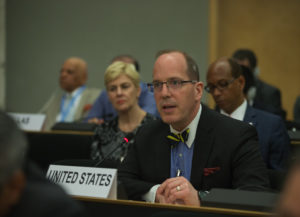By Taylor Felt, Policy Intern
 For two weeks starting April 29, diplomats from around the world will gather for the Preparatory Committee (PrepCom) to the 2020 Nuclear Non-proliferation Treaty Review Conference to discuss nuclear news and concerns that could interfere with global non-proliferation efforts.
For two weeks starting April 29, diplomats from around the world will gather for the Preparatory Committee (PrepCom) to the 2020 Nuclear Non-proliferation Treaty Review Conference to discuss nuclear news and concerns that could interfere with global non-proliferation efforts.
PrepComs center around the Nuclear Non-Proliferation Treaty (NPT), which has been signed by 191 countries and has helped prevent the spread of nuclear weapons worldwide. Considered the cornerstone of the global non-proliferation regime, the NPT is essential to the security of all nations.
The broad nature of the NPT inherently requires its signatories to continuously review and re-commit to the treaty. Since the NPT entered into force in 1970, major world events and nuclear developments have reshaped the international world order. For example, in 2003, North Korea withdrew from the treaty and subsequently conducted six explosive nuclear tests. PrepComs lay the groundwork for productive international talks on nuclear risks affecting every person on earth, but few people outside international policy circles know anything about them. Here are five things you should know about the 2019 PrepCom.
- How PrepCom started: The first PrepCom was born out of a 1995 NPT Review and Extension Conference, where participating parties agreed to indefinitely extend the NPT, which originally lasted for 25 years with the option for extension. Participants also determined that PrepCom meetings would be held in each of the three years before the Review Conferences (RevCons). PrepCom meetings are open to all NPT signatories, with the purpose of “consider[ing] principles, objectives and ways to promote the full implementation of the Treaty” and to “make recommendations thereon to the Review Conference.” The first PrepCom meeting took place in 1997, in preparation for the 2000 RevCon, and has consistently met in the years leading up to each RevCon since then.
- PrepCom responsibilities: According to the NPT, the “Preparatory Committee […] is responsible for addressing substantive and procedural issues relating to the Treaty. PrepCom meetings provide signatories a forum to discuss current, pressing nuclear issues and to look toward future developments relating to nuclear weapons and nuclear energy.
- What PrepCom can’t do: PrepCom is not a decision-making body; rather, its purpose is to propose recommendations that can be officially considered at the next RevCon. The PrepComs set the stage for a productive RevCon, creating a greater possibility that parties will walk away with a substantive action plan at the conclusion of each conference.
- Critical timing for key discussions: This will be the third and final PrepCom meeting before the 2020 NPT RevCon (the main event takes place every five years). The meeting will cover big-picture discussions regarding the current status and future of the global non-proliferation regime. There is no doubt that delegations will discuss their obligations under the NPT, with particular focus on Article VI, which commits each party to the treaty to undertake “negotiations in good faith on effective measures relating to cessation of the nuclear arms race at an early date and to nuclear disarmament.” Delegations are also likely to discuss pressing nuclear issues, such as North Korea’s nuclear program, the future of the Joint Comprehensive Plan of Action (also known as the Iran nuclear agreement), and the state of strategic stability between Russia and the United States. Despite the fact that India and Pakistan are not members of the NPT, the recent increased tensions between these two nuclear-armed nations is sure to come up. Parties to the PrepCom often submit working papers on topics ranging from nuclear security to humanitarian implications of nuclear weapons, all of which can be used as means for the NPT’s continuous implementation.
- Finding common ground: The PrepComs and subsequent RevCons help ensure that nations are dealing with changes in the security environment and continuously working to strengthen and support the agreement. Finding common ground is easier said than done, but the meetings are the best way of facilitating consensus on how to reduce and eventually eliminate nuclear risks.
Given the increased relevance of nuclear weapons in world politics today, as well as the fragmentation of international arms control and non-proliferation agreements, there is a shadow over the 2019 PrepCom and contentious debate is a certainty. As delegations descend on the United Nations headquarters in New York, the hope is that the session can provide the space to ensure that the NPT remains relevant and recommits world leaders to the ultimate goal of a world without nuclear weapons.
